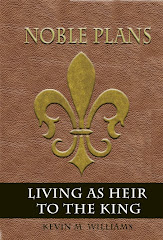In the medieval period, a lord or lady’s honour was the group of manors or lands he or she held. “The word was first used indicating an estate which gave its holder dignity and status.”* For a person to say “on my honour” was not just an affirmation of his or her integrity and rank, but the veracity behind that phrase meant he or she was willing to offer up estates as pledge and guarantee. (Excerpted from Noble Plans)
The meaning of honor has changed over time, hasn't it? What about the biblical definition?
One Hebrew word for "honor" is kabad, and like a coin, this singular word has two sides to it. Side one: honor, glorify, abundance. The other side: heavy, burdensome. Think about that for a moment, that biblically, one cannot come without the other. Perhaps that brings some clarity to Exodus 20:12, were we are instructed to "honor/kabad" both father and mother.
Again, time has greatly diluted the early understanding and application of "honor." Is there a way to recapture some of the old "recipe?" Can life be lived so that when we give our word, it has the full pledge of all we are behind it? Can honor be received knowing and accepting the burdens that come with it?
Here is something to think about as you make your noble plans: "But above all, my brethren, do not swear, either by heaven or by earth or with any other oath; but let your yes be yes, and your no, no" (James 5:12). As fellow sharers in the inheritance of the Great High King, our word is our bond. When you say "yes," stand by your word. When you say "no," mean it and do not stray. You are the Sovereign's ambassador in this world (2Co 5:20 ). He would not waiver, He would not change His Word. As His appointed ambassador, bearing the honor of the Sovereign King, should you?
 |
"A noble man devises noble plans; and by noble plans he stands"
*A Dictionary of Medieval Terms and Phrases, Christopher Corédon, ©2004, D.S. Brewer, Cambridge





No comments:
Post a Comment